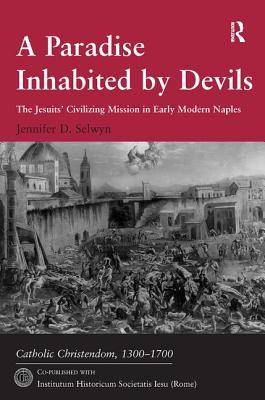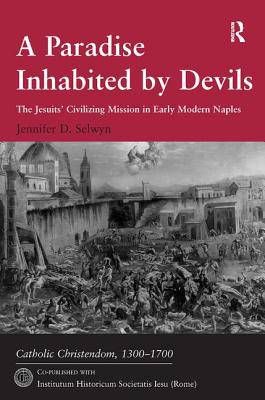
- Retrait gratuit dans votre magasin Club
- 7.000.000 titres dans notre catalogue
- Payer en toute sécurité
- Toujours un magasin près de chez vous
- Retrait gratuit dans votre magasin Club
- 7.000.0000 titres dans notre catalogue
- Payer en toute sécurité
- Toujours un magasin près de chez vous
A Paradise Inhabited by Devils
The Jesuits' Civilizing Mission in Early Modern Naples
Jennifer D Selwyn
305,45 €
+ 610 points
Description
In recent years much scholarly attention has been focused on the encounter of cultures during the early modern period, and the global implications that such encounters held. As a result of this work, scholars have now begun to re-evaluate many aspects of early culture contact, not least with respect to Christian missionary activities. Prominent amongst the missionaries were members of the Society of Jesus. Emerging as a dynamic new religious order in the wake of the Reformation, the Jesuits were deeply committed to promoting religious and cultural reforms both within Europe and in non-Christian lands. Yet whilst scholars have revealed much about the Jesuits' innovative educational endeavours, and their numerous missions to the Americas, Asia and the Sub-Continent, less attention has been paid to the nature of the Jesuits' global civilizing mission as a key feature of their institutional character. Nor has sufficient work been done to fully explain the relationship between the Jesuits' efforts to evangelize and civilize those areas within the Catholic fold and those without. Taking as its focus the city of Naples, this study illuminates how the Jesuits' work in a Catholic European setting reflected their broader global civilizing mission. Despite its Catholic heritage, Naples was popularly perceived as a place of spiritual and social disorder, thus providing an irresistible challenge to religious reformers, such as the Jesuits, who sought to 'civilize' the city. Drawing in considerable numbers of the order, Naples proved to be a training ground for the Jesuits that shaped the order's missionary praxis and influenced the thinking of many who would later travel further afield. By gaining a fuller understanding of this process, it is possible to better understand what drove the Jesuits to craft and perpetuate a cultural map that continues to resonate down to our own times. This book is published in conjunction with the Jesuit Historical Institute series 'Bibliotheca Instituti Historici Societatis Iesu'.
Spécifications
Parties prenantes
- Auteur(s) :
- Editeur:
Contenu
- Nombre de pages :
- 292
- Langue:
- Anglais
- Collection :
- Tome:
- n° 57
Caractéristiques
- EAN:
- 9788870413571
- Date de parution :
- 02-09-04
- Format:
- Livre relié
- Format numérique:
- Genaaid
- Dimensions :
- 156 mm x 234 mm
- Poids :
- 589 g

Les avis
Nous publions uniquement les avis qui respectent les conditions requises. Consultez nos conditions pour les avis.






